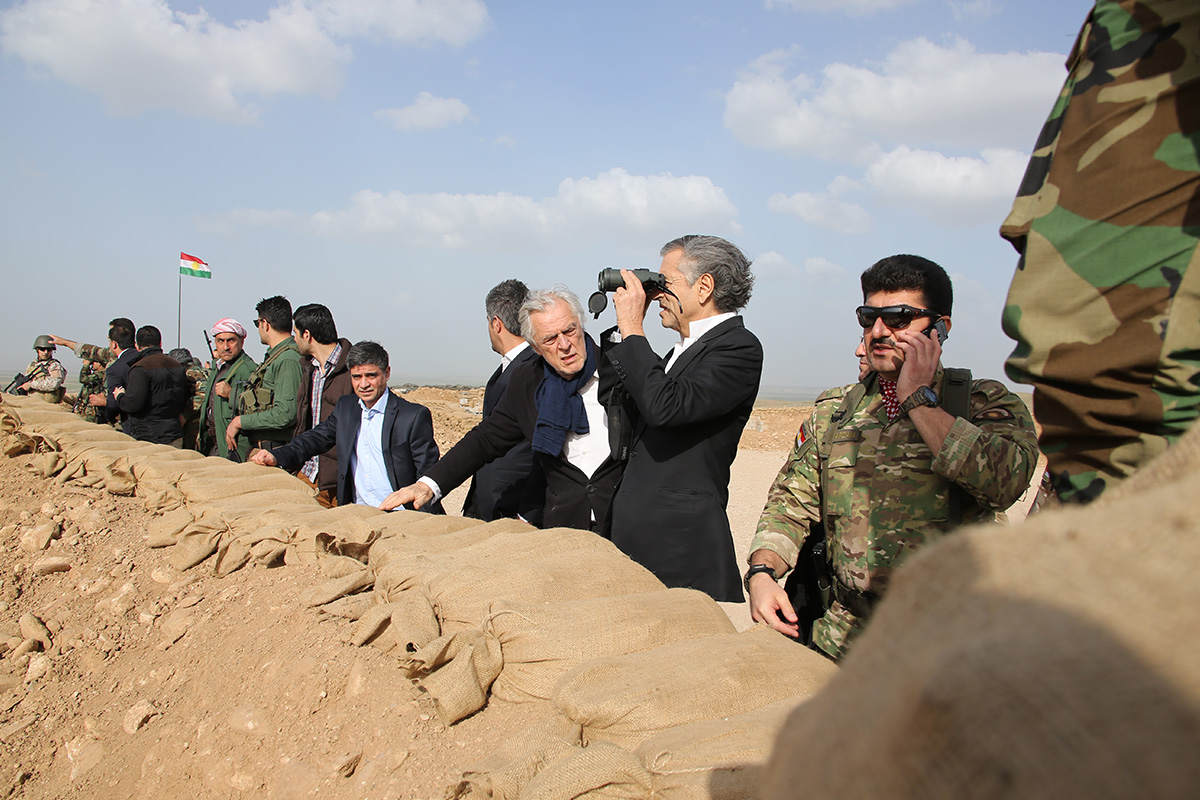Bernard-Henri Lévy: Jews Have ‘Special Obligation’ to Support Kurdish Independence
One of the most prominent Western champions of Kurdish national rights has praised Monday’s referendum on independence as the expression of a “just” desire on the part of the Kurds “to leave Iraq, which is a tyrannical, authoritarian, murderous state.”
“Their referendum is legal, legitimate, and just,” the French-Jewish writer and public intellectual Bernard-Henri Lévy told The Algemeiner on Monday, as voting began in the three provinces that formed the autonomous region of Kurdistan in 2003, as well as in territories disputed with the central government in Baghdad, such as the oil-rich province of Kirkuk.
Lévy — whose involvement with the Kurdish cause goes back to the early 1990s, when he highlighted the genocidal campaign waged by Saddam Hussein’s regime in Iraq — said the moral case for a referendum had never been so clear.
“Look who is coming together against the Kurds,” Lévy noted. “Look at this awful, pathetic alliance between Erdogan’s Turkey and the ayatollahs’ Iran, with the failed state of Iraq bobbing in Iran’s wake. Isn’t it obvious that right, honor, and, therefore, morality, are on the side of the Kurds?”
Lévy was scathing on the subject of the Kurds’ immediate neighbors, calling Turkey, Iran and Iraq “the same gang” as far as the Kurds are concerned.
“When you think that the three of them have the nerve to appeal to international law,” he said. “The hands of Iran’s leaders are still wet with the blood of the 400,000 Syrians that Bashar al-Assad has butchered with the help of Hezbollah. Turkey has on its hands the blood of the lawyers, intellectuals, military officers, and ordinary citizens who have been tortured to death in the jails of Istanbul and Ankara. Iraq, just in recent memory, has that of the thousands of Kurds gassed in Halabja (when thousands of Kurds were killed in a poison gas attack on this city launched by Iraqi forces.)”
“And this merry band is invoking law and morality?” Lévy continued. “We must be dreaming.” He argued that the Erdogan regime poses the most immediate threat to Kurdish independence, “because it has, in addition to all the rest, economic leverage.”
“Everything on which the Kurdish economy depends comes and goes through Turkey,” he said.
Lévy praised Israel for its supportive stance on the Kurdish referendum — the only country to express such backing. By Monday night, with nearly all the votes counted, more than 93 percent of voters had answered “yes” to the question — posed in the Kurdish, Arabic, Turkmen and Assyrian languages – “Do you want the Kurdistan Region and the Kurdistani areas outside the administration of the Region to become an independent state?” Some 25 million mainly Muslim Kurds are currently divided between Turkey, Iraq, Iran and Syria.
“I’m glad that Israel’s leaders have finally understood that the Kurds are their natural allies,” Lévy said. “Not allies of convenience, not tactical allies, not the sort of allies that one embraces in spite of disagreements simply because one has no others.”
Arguing that Israel and Kurdistan “share the same ethical and political principles,” Lévy declared that “Iraqi Kurdistan is the only Muslim country where the alliance with Israel is perceived not as a necessary evil but as a source of pride.” Israeli politicians across the spectrum have spoken out in support of Kurdish independence, with Yesh Atid leader Yair Lapid telling The Algemeiner on Sunday, “The Jewish people know what it is to struggle for an independent homeland.”
Lévy added, “By the way, that is what Erdogan had in mind when he said, in his inimitable style, that he feared the birth of a ‘second Israel.'” In recent weeks, pro-Erdogan media outlets in Turkey have been filled with antisemitic conspiracy theories alleging that the Kurdish vote is a “Zionist plot” coordinated by Israel in order to resettle 200,000 Kurdish Jews in the region.
Lévy had similarly harsh words for the Western democracies that have acquiesced to Turkish, Iranian and Iraqi pressure on the referendum, despite the consistent records of the Kurds as allies of the west. “When you see the democracies with their eyes riveted on the slightest change in the mood of these sensitive characters, when you see them tripping over each other to serve as their interpreters and even as their press attachés, well now the dream [of Kurdish independence] has become a nightmare,” Lévy reflected.
The philosopher described his two recent films on the Kurds — “Peshmerga,” the name for Kurdish fighters, and “The Battle of Mosul,” which documents the fight against ISIS in the northern Iraqi city — as “a modest attempt to repay them in very small part for what they have given us.”
A forthcoming showing of “Peshmerga” in New York City would, Lévy said, serve as a partial riposte to US President Donald Trump for his “scandalous lack of gratitude…throwing the Kurds away now that they’ve served their purpose.” On September 15, the Trump administration expressed its opposition to the Kurdish vote, claiming that the US “has repeatedly emphasized to the leaders of the Kurdistan Regional Government that the referendum is distracting from efforts to defeat ISIS and stabilize the liberated areas.”
Lévy urged Jews around the world to engage in a “generous show of friendship” toward the Kurds.
“Jews have a special obligation to support the Kurds,” he said. “I hope they will come say to the Peshmerga: ‘For years now you have spilled your blood to defend the values of our shared civilization. Now it is our turn to defend your right to live freely and independently.'”
Source: The Algemeiner

